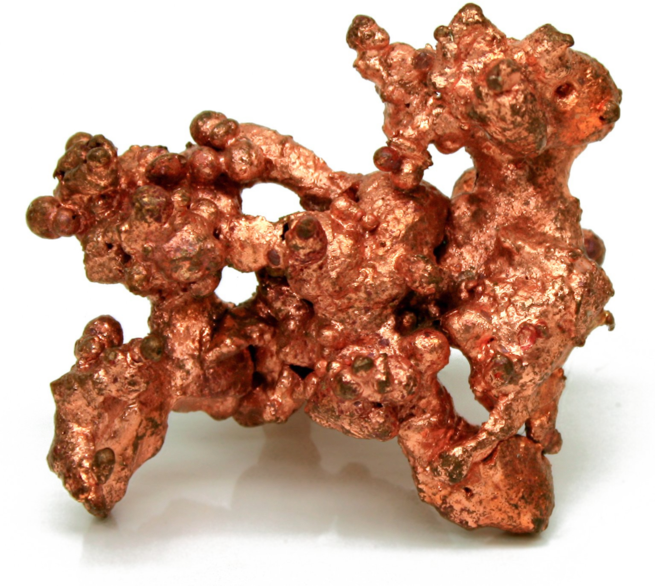
Main Difference
The main difference between Copper and Brass is that the Copper is a chemical element with the atomic number of 29 and Brass is a alloy of copper and zinc.
-
Copper
Copper is a chemical element with symbol Cu (from Latin: cuprum) and atomic number 29. It is a soft, malleable, and ductile metal with very high thermal and electrical conductivity. A freshly exposed surface of pure copper has a reddish-orange color. Copper is used as a conductor of heat and electricity, as a building material, and as a constituent of various metal alloys, such as sterling silver used in jewelry, cupronickel used to make marine hardware and coins, and constantan used in strain gauges and thermocouples for temperature measurement.
Copper is one of the few metals that occur in nature in directly usable metallic form (native metals) as opposed to needing extraction from an ore. This led to very early human use, from c. 8000 BC. It was the first metal to be smelted from its ore, c. 5000 BC, the first metal to be cast into a shape in a mold, c. 4000 BC and the first metal to be purposefully alloyed with another metal, tin, to create bronze, c. 3500 BC.
In the Roman era, copper was principally mined on Cyprus, the origin of the name of the metal, from aes сyprium (metal of Cyprus), later corrupted to сuprum, from which the words copper (English), cuivre (French), cobre (Spanish), Koper (Dutch) and Kupfer (German) are all derived. The commonly encountered compounds are copper(II) salts, which often impart blue or green colors to such minerals as azurite, malachite, and turquoise, and have been used widely and historically as pigments. Copper used in buildings, usually for roofing, oxidizes to form a green verdigris (or patina). Copper is sometimes used in decorative art, both in its elemental metal form and in compounds as pigments. Copper compounds are used as bacteriostatic agents, fungicides, and wood preservatives.
Copper is essential to all living organisms as a trace dietary mineral because it is a key constituent of the respiratory enzyme complex cytochrome c oxidase. In molluscs and crustaceans, copper is a constituent of the blood pigment hemocyanin, replaced by the iron-complexed hemoglobin in fish and other vertebrates. In humans, copper is found mainly in the liver, muscle, and bone. The adult body contains between 1.4 and 2.1 mg of copper per kilogram of body weight.
-
Brass
Brass is an alloy of copper and zinc, in proportions which can be varied to achieve varying mechanical and electrical properties. It is a substitutional alloy: atoms of the two constituents may replace each other within the same crystal structure.
In contrast, bronze is an alloy of copper and tin. Both bronze and brass may include small proportions of a range of other elements including arsenic, lead, phosphorus, aluminium, manganese, and silicon. The distinction is largely historical. Modern practice in museums and archaeology increasingly avoids both terms for historical objects in favour of the all-embracing “copper alloy”.Brass is used for decoration for its bright gold-like appearance; for applications where low friction is required such as locks, gears, bearings, doorknobs, ammunition casings and valves; for plumbing and electrical applications; and extensively in brass musical instruments such as horns and bells where a combination of high workability (historically with hand tools) and durability is desired. It is also used in zippers. Brass is often used in situations in which it is important that sparks not be struck, such as in fittings and tools used near flammable or explosive materials.
-
Copper (noun)
A reddish-brown, malleable, ductile metallic element with high electrical and thermal conductivity, symbol Cu, and atomic number 29.
-
Copper (noun)
Something made of copper.
-
Copper (noun)
The reddish-brown colour/color of copper.
“color panel|BB5836”
-
Copper (noun)
A copper coin.
-
Copper (noun)
A large pot, often used for heating water or washing clothes over a fire. In Australasia at least, it could also be a fixed installation made of copper, with a fire underneath and its own chimney. Generally made redundant by the advent of the washing machine.
“Mum would heat the water in a copper in the kitchen and transfer it to the tin bath.”
“I explain that socks can’t be boiled up in the copper with the sheets and towels or they shrink.”
-
Copper (noun)
A police officer.
-
Copper (adjective)
Made of copper.
-
Copper (adjective)
Having the reddish-brown colour/color of copper.
-
Copper (verb)
To sheathe or coat with copper.
-
Brass (noun)
A metallic alloy of copper and zinc used in many industrial and plumbing applications.
-
Brass (noun)
A memorial or sepulchral tablet usually made of brass or latten
-
Brass (noun)
A class of wind instruments, usually made of metal (such as brass), that use vibrations of the player’s lips to produce sound.
-
Brass (noun)
Spent shell casings (usually made of brass); the part of the cartridge left over after bullets have been fired.
-
Brass (noun)
The colour of brass.
“color panel|C9AE5D”
-
Brass (noun)
High-ranking officers.
“The brass are not going to like this.”
“The brass is not going to like this.”
-
Brass (noun)
A brave or foolhardy attitude; impudence.
“You’ve got a lot of brass telling me to do that!”
-
Brass (noun)
Money.
-
Brass (noun)
Inferior composition.
-
Brass (noun)
Brass in pocket; money.
-
Brass (noun)
A brass nail; a prostitute.
-
Brass (adjective)
Made of brass, of or pertaining to brass.
-
Brass (adjective)
Of the colour of brass.
-
Brass (adjective)
Impertinent, bold: brazen.
-
Brass (adjective)
Bad, annoying; as wordplay applied especially to brass instruments.
-
Brass (adjective)
Of inferior composition.
-
Brass (adjective)
Brass monkey; cold.
-
Brass (verb)
to coat with brass
